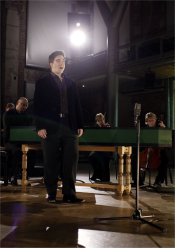One might say they reflected rather neatly the subject of this film recently
made for television by BBC Producer Francesca Kemp: those fabled creatures of
the 17th and 18th centuries, the Castrati. These singers were such artists,
such performers, such celebrities in their heyday of the mid baroque, that
our musical folk memory is still full of them — they have never really died.
It seems that each new generation of music lovers is re-discovering their
story, is enraptured by the myth, and fascinated by the reality of their
lives as we know it today. But the greatest fascination of all is the voice
itself — what did it sound like? Would we recognise it as the marvel it was
then considered? We are still chasing that holy grail, that rainbow’s
end, with ever more sophisticated methods, and this film sets out to try to
illuminate, if not answer, some of the questions we still have about it.
If you are wondering just why people might be tempted to watch, Kemp
herself has no such doubts. “We're so much more interested in their
repertoire now, especially the operatic; it’s a natural extension of
the recent explosion of interest in the countertenor voice. And we're so much
more aware of issues around period style — we know how exciting and revealing
it is to hear Mozart concerti played on a fortepiano, and I think there's an
equally valid interest in getting closer to understanding what this
particular vocal quality might or might not have been.” She adds:
“And more broadly, it's a fascinating model for understanding our
eternal obsession with the humanly bizarre or unusual, and our current
preoccupations with a whole host of socio-cultural issues such as fame at any
price/body alteration/gender models/child abuse and so on.”
The film’s central scientific thrust is one of the attempted
regeneration of the voice electronically, and unlike the well-known attempt
to do this for the feature film “Farinelli” whereby the engineers
rather crudely morphed a soprano and countertenor voice, here the professors
and scientists seek to try to match electronically on a computer certain
elements of what is probably our only recorded history of a castrato voice,
that of Alessandro Moreschi, with elements of a tenor and treble voice. How
they do this, and what they base their ideas on, makes for interesting
viewing and listening. Whether the final result satisfies, or merely
frustrates, will be up to the viewer to decide — certainly there is no
definitive answer here even if intriguing pathways are opened up for
exploration. As presenter Nicholas Clapton (author of works on the castrati)
says: “In the recordings of Moreschi, which I do not believe are as bad
as many people do, we have “documentary” evidence of the castrato sound.
There is a strong tenor element in his voice, although because of his
child-size vocal tract it is a tenor sound “up an octave”, with what sounds
rather like a super-charged treble above that.”
During the experiments, we hear examples of several voices: boy treble,
soprano, countertenor (Clapton himself,) and perhaps most exciting of all,
that of the young American operatic male soprano Michael Maniaci. Excerpts of
his rendition of the Alleluja from Mozart's motet “Exultate, jubilate”, K.
165, written in 1773 for the famous castrato Venanzio Rauzzini, certainly
raise the musical temperature of the film many notches and were impressive.
(As a footnote, Mozart also created the role of Lucio Cinna for Rauzzini in
his opera “Lucio Silla” — a role that Maniaci has recently sung
at Santa Fe Opera).
In contrast to the music made by this male soprano, the electronic
experiments seem only to have produced some, frankly, unattractive sounds so
far and I asked for Francesca Kemp’s view. “Yes I agree Michael
is completely wonderful. But I do wonder whether we're right to think that
he's “closer” to the castrato sound than the other electronic or human
examples ………we don't know what the end result should be,
and as is pointed out in the film, we absolutely don't know that we'd like
the sound of an 18th century castrato voice any more than we tend to “like”
that of Moreschi”. Clapton agrees: “My hunch is that modern
listeners would find the voice, manner and whole performance of a castrato
like Farinelli extremely strange, indeed alien, much like we would find the
conversation of Handel, Johnson, or George II extremely peculiar
today”.
If so, despite our enduring fascination with these long-dead superstars,
perhaps this is a reason for letting sleeping voices lie?
S.C. Loder © 2006
(The broadcast is scheduled for screening on
BBC 4 television in the UK, on July 5th at 2100hrs.)
